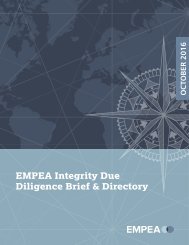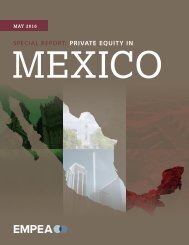Create successful ePaper yourself
Turn your PDF publications into a flip-book with our unique Google optimized e-Paper software.
The OECD has reviewed over 100 jurisdictions for the<br />
Global Forum. Some <strong>of</strong> these resulted from the earlier work<br />
<strong>of</strong> the Financial Action Task Force (FATF), while others were<br />
added later or as a result <strong>of</strong> requests from governments for a<br />
peer review. The main focus is on “Exchange <strong>of</strong> Information<br />
on Request” (EOIR) in relation to tax transparency and cooperation,<br />
which is carried out through peer reviews. The<br />
peer review process evaluates jurisdictions’ compliance with<br />
the international standard <strong>of</strong> transparency and exchange <strong>of</strong><br />
information on request. It focuses on three components:<br />
(i) availability <strong>of</strong> information; (ii) access to information; and<br />
(iii) exchange <strong>of</strong> information. Phase 1 reviews examine the<br />
legal and regulatory framework; Phase 2 reviews look into<br />
the implementation <strong>of</strong> this framework in practice. Countries<br />
are initially subject to a Phase I review, and those that are<br />
found to be sufficiently compliant—after taking remedial<br />
action to rectify any deficiencies, if necessary—can proceed<br />
to a Phase 2. After completion <strong>of</strong> both Phases <strong>of</strong> the review<br />
process, each jurisdiction receives an overall rating. 5<br />
The OECD-Global Forum assessment is one <strong>of</strong> the most<br />
important assessments for a financial centre. It is especially<br />
relevant for investments by government-related entities,<br />
which need to pay particular attention to governance and<br />
public policy related issues. The lack <strong>of</strong> a Global Forum<br />
assessment, or an adverse peer review finding, can seriously<br />
undermine a country’s ability to attract internationally mobile<br />
financial investments. For a country with a significant<br />
financial services industry, or aspirations to develop one,<br />
the commercial implications are potentially large. 6<br />
Finally, an international research and advocacy group,<br />
the Tax Justice Network, has assessed 82 jurisdictions in<br />
terms <strong>of</strong> “Financial Secrecy.” The Financial Secrecy Index<br />
is based on the degree <strong>of</strong> transparency (or not) according<br />
to 15 “key financial secrecy indicators” and an assessment<br />
<strong>of</strong> the country’s global importance.<br />
The jurisdictions included in these assessments are<br />
included as Appendix I.<br />
3. FUND MANAGERS’<br />
ATTITUDES TOWARDS<br />
OFFSHORE / ONSHORE<br />
FINANCIAL CENTRES<br />
The attitudes <strong>of</strong> fund managers and other key financial sector<br />
players towards FCs depends on their role, objectives and the<br />
regulatory environment.<br />
Discussions with fund managers who have had experience<br />
<strong>of</strong> establishing funds in Africa indicate that a number <strong>of</strong><br />
criteria are taken into account when deciding upon a<br />
jurisdiction for domicile.<br />
These include:<br />
Tax Arrangements and Effective Tax Rate:<br />
– Headline tax rates<br />
– Tax allowances<br />
– Certainty <strong>of</strong> tax rates / arrangements<br />
– Extent <strong>of</strong> Double Taxation Agreements (DTAs)<br />
Legal and Regulatory Issues<br />
– Nature <strong>of</strong> regulatory and legal framework<br />
– Capability <strong>of</strong> regulator and speed <strong>of</strong> decision-making<br />
– Regulatory transparency, consistency and efficiency<br />
– Exchange controls<br />
– Treatment by external regulators; external reputation<br />
and perceptions<br />
– Bilateral investment protection agreements<br />
Support Services, Skills and Infrastructure<br />
– Services (company secretaries, accountants,<br />
administrators, etc.)<br />
– Specialised skills (local availability or ease <strong>of</strong><br />
immigration for expatriates)<br />
– Transport, buildings, communications<br />
– Stock exchange<br />
Political and Economic Environment<br />
– Political stability<br />
– Macroeconomic stability<br />
– Labour relations<br />
5<br />
The ratings are “Compliant”; “Largely Compliant”; “Partially Compliant”; and “Non-Compliant.”<br />
6<br />
As at the end <strong>of</strong> 2014, the following jurisdictions were Non-Compliant following a Phase II assessment: British Virgin Islands; Cyprus; Luxembourg; The<br />
Seychelles. The following jurisdictions were not eligible to proceed to Phase II following a Phase I assessment: Brunei; Marshall Islands; Dominica;<br />
Micronesia; Guatemala; Lebanon; Liberia; Panama; Nauru; Switzerland; Trinidad; Vanuatu.<br />
<strong>Conduits</strong> <strong>of</strong> <strong>Capital</strong> – Onshore Financial Centres and Their Relevance to African Private Equity<br />
| 71





